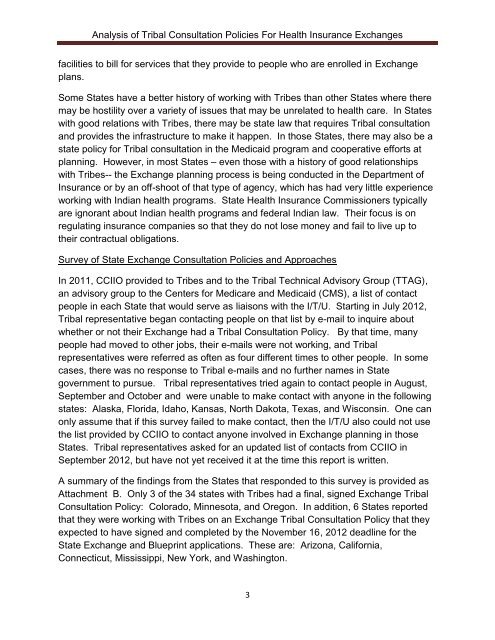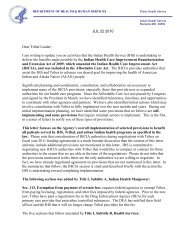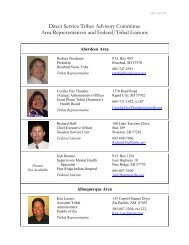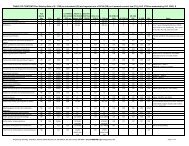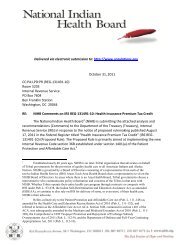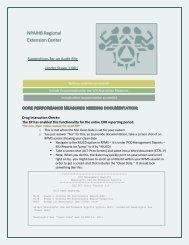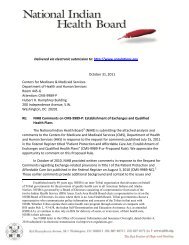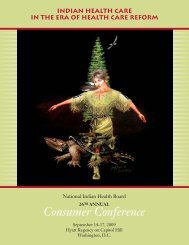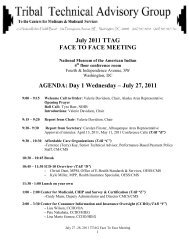mmpc - National Indian Health Board
mmpc - National Indian Health Board
mmpc - National Indian Health Board
You also want an ePaper? Increase the reach of your titles
YUMPU automatically turns print PDFs into web optimized ePapers that Google loves.
Analysis of Tribal Consultation Policies For <strong>Health</strong> Insurance Exchanges<br />
facilities to bill for services that they provide to people who are enrolled in Exchange<br />
plans.<br />
Some States have a better history of working with Tribes than other States where there<br />
may be hostility over a variety of issues that may be unrelated to health care. In States<br />
with good relations with Tribes, there may be state law that requires Tribal consultation<br />
and provides the infrastructure to make it happen. In those States, there may also be a<br />
state policy for Tribal consultation in the Medicaid program and cooperative efforts at<br />
planning. However, in most States – even those with a history of good relationships<br />
with Tribes-- the Exchange planning process is being conducted in the Department of<br />
Insurance or by an off-shoot of that type of agency, which has had very little experience<br />
working with <strong>Indian</strong> health programs. State <strong>Health</strong> Insurance Commissioners typically<br />
are ignorant about <strong>Indian</strong> health programs and federal <strong>Indian</strong> law. Their focus is on<br />
regulating insurance companies so that they do not lose money and fail to live up to<br />
their contractual obligations.<br />
Survey of State Exchange Consultation Policies and Approaches<br />
In 2011, CCIIO provided to Tribes and to the Tribal Technical Advisory Group (TTAG),<br />
an advisory group to the Centers for Medicare and Medicaid (CMS), a list of contact<br />
people in each State that would serve as liaisons with the I/T/U. Starting in July 2012,<br />
Tribal representative began contacting people on that list by e-mail to inquire about<br />
whether or not their Exchange had a Tribal Consultation Policy. By that time, many<br />
people had moved to other jobs, their e-mails were not working, and Tribal<br />
representatives were referred as often as four different times to other people. In some<br />
cases, there was no response to Tribal e-mails and no further names in State<br />
government to pursue. Tribal representatives tried again to contact people in August,<br />
September and October and were unable to make contact with anyone in the following<br />
states: Alaska, Florida, Idaho, Kansas, North Dakota, Texas, and Wisconsin. One can<br />
only assume that if this survey failed to make contact, then the I/T/U also could not use<br />
the list provided by CCIIO to contact anyone involved in Exchange planning in those<br />
States. Tribal representatives asked for an updated list of contacts from CCIIO in<br />
September 2012, but have not yet received it at the time this report is written.<br />
A summary of the findings from the States that responded to this survey is provided as<br />
Attachment B. Only 3 of the 34 states with Tribes had a final, signed Exchange Tribal<br />
Consultation Policy: Colorado, Minnesota, and Oregon. In addition, 6 States reported<br />
that they were working with Tribes on an Exchange Tribal Consultation Policy that they<br />
expected to have signed and completed by the November 16, 2012 deadline for the<br />
State Exchange and Blueprint applications. These are: Arizona, California,<br />
Connecticut, Mississippi, New York, and Washington.<br />
3


